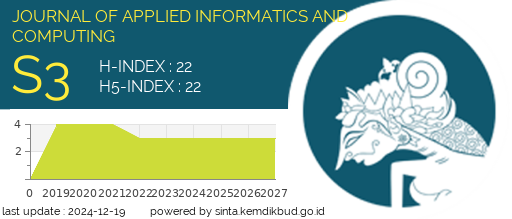Sistem Pakar Cara Mendidik Anak Pelajaran Agama Islam Sesuai Al-Qur'an Menggunakan Metode Forward Chaining
DOI:
https://doi.org/10.30871/jaic.v7i1.5104Keywords:
Al-Qur’an, Educational Methods, Expert System, Forward ChainingAbstract
The Al-Qur'an indirectly provides methods for educating children from an early age, as listed in Al-Ahqaf [46]: 30. The implementation of these educational methods requires an expert, specifically an Islamic religious teacher who can suggest appropriate methods to use. Hence, in this context, there is a need to develop an expert system application that can assist teachers in recommending suitable educational methods to parents or guardians based on the child's behavior input. The "expert-mendidik-islam.com" application is created using the forward chaining method, which is employed for reasoning in the database system through rules derived from interviews with experts. The existing child behaviors and rules can be added through the admin page. To evaluate the application, a Likert model questionnaire was administered to parents or guardians of students at SDN 44 Amban and SDN 48 Inggramui, Manokwari Regency. The questionnaire results consistently scored above 80%, indicating that the users strongly agreed with the questionnaire and the application's effectiveness.
Downloads
References
M. I. Dacholfany and U. Hasanah, Pendidikan anak usia dini menurut konsep islam. Amzah, 2021.
A. Qowim, "Metode Pendidikan Islam Perspektif Al-Qur'an. IQ (Ilmu Al-Qur'an): Jurnal Pendidikan Islam, 3 (01), 35"“58." 2020. https://doi.org/10.37542/iq.v3i01.53
D. E. Kurniawan, A. Dzikri, H. Widyastuti, E. Sembiring, and R. T. Manurung, "Smart mathematics: a Kindergarten student learning media based on the drill and practice model," in Journal of Physics: Conference Series, IOP Publishing, 2019, p. 012037.
D. E. Kurniawan and A. Dzikri, "Program pengabdian guru dan tata usaha TK/RA di Batam," KACANEGARA Jurnal Pengabdian pada Masyarakat, vol. 5, no. 1, Art. no. 1, Jan. 2022, doi: 10.28989/kacanegara.v5i1.1052.
G.-J. Hwang, H.-Y. Sung, S.-C. Chang, and X.-C. Huang, "A fuzzy expert system-based adaptive learning approach to improving students' learning performances by considering affective and cognitive factors," Computers and Education: Artificial Intelligence, vol. 1, p. 100003, Jan. 2020, doi: 10.1016/j.caeai.2020.100003.
M. S. M. Saad and R. M. Rasli, "Web Based Expert System in Area & Land Value Calculation and Faraid Distribution," International Journal of Artificial Intelligence, vol. 9, no. 2, Art. no. 2, Dec. 2022, doi: 10.36079/lamintang.ijai-0902.468.
A. Ramadhanu and R. Gusrianto, "Sistem Pakar Diagnosa Penyakit Rubeola Pada Anak Menggunakan Metode Forward Chaining Dengan Bahasa Pempograman Php & Database Mysql," Jurnal Teknologi Dan Sistem Informasi Bisnis, vol. 3, no. 1, Art. no. 1, Jan. 2021, doi: 10.47233/jteksis.v3i1.216.
Z. Hakim and R. Rizky, "Sistem Pakar Menentukan Karakteristik Anak Kebutuhan Khusus Siswa Di SLB Pandeglang Banten Dengan Metode Forward Chaining," Jutis (Jurnal Teknik Informatika), vol. 7, no. 1, pp. 93"“97, 2019.
I. Effendi and G. W. Nurcahyo, "Sistem Pakar Menggunakan Metode Forward Chaining dalam Identifikasi Kemampuan Siswa Terhadap Bidang Vokasi Pada Sekolah Menengah Kejuruan," Jurnal Informasi dan Teknologi, pp. 21"“28, Mar. 2021, doi: 10.37034/jidt.v3i1.83.
I. A. Wisky and D. Akhiyar, "Sistem Pakar Untuk Mendiagnosa Penyakit Tulang Berbasis Web Menggunakan Metode Forward Chaining," Jurnal Sains dan Teknologi: Jurnal Keilmuan dan Aplikasi Teknologi Industri, vol. 19, no. 1, Art. no. 1, Aug. 2019, doi: 10.36275/stsp.v19i1.126.
M. Y. Prasetyo, U. Darusalam, and B. Benrahman, "Web-Based Expert System for Diagnosis of Pigeon Disease by Naïve Bayes Method," Journal of Applied Informatics and Computing, vol. 4, no. 2, Art. no. 2, Dec. 2020, doi: 10.30871/jaic.v4i2.2706.
D. E. Kurniawan, B. F. Alamandha, N. F. Ramadhani, M. Raffi, and R. Erviani, Responsive Web Design: Praktik Membuat Aplikasi Produk Lokal. Media Sains Indonesia, 2021.
W. I. Rahayu, M. H. K. Saputra, and others, Penerapan Metode Naive Bayes dan Skala Likert Pada Aplikasi Prediksi Kelulusan Mahasiswa. Kreatif, 2020.
Downloads
Published
How to Cite
Issue
Section
License
Copyright (c) 2023 Farid Maulidan, Christian Dwi Suhendra, Ratna Juita

This work is licensed under a Creative Commons Attribution-ShareAlike 4.0 International License.
Authors who publish with this journal agree to the following terms:
- Authors retain copyright and grant the journal right of first publication with the work simultaneously licensed under a Creative Commons Attribution License (Attribution-ShareAlike 4.0 International (CC BY-SA 4.0) ) that allows others to share the work with an acknowledgement of the work's authorship and initial publication in this journal.
- Authors are able to enter into separate, additional contractual arrangements for the non-exclusive distribution of the journal's published version of the work (e.g., post it to an institutional repository or publish it in a book), with an acknowledgement of its initial publication in this journal.
- Authors are permitted and encouraged to post their work online (e.g., in institutional repositories or on their website) prior to and during the submission process, as it can lead to productive exchanges, as well as earlier and greater citation of published work (See The Effect of Open Access).











